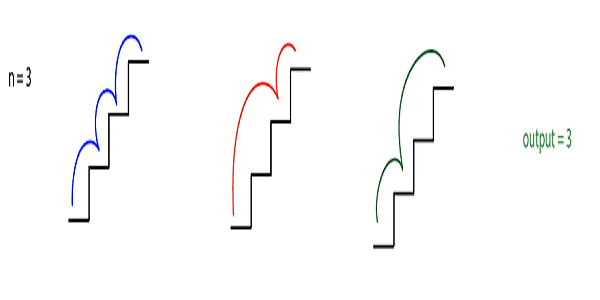You have been given a number of stairs. Initially, you are at the 0th stair, and you need to reach the Nth stair. Each time you can either climb one step or two steps. You are supposed to return the number of distinct ways in which you can climb from the 0th step to Nth step.
Example :
N=3

We can climb one step at a time i.e. {(0, 1) ,(1, 2),(2,3)} or we can climb the first two-step and then one step i.e. {(0,2),(1, 3)} or we can climb first one step and then two step i.e. {(0,1), (1,3)}.
Input format :
The first line contains an integer 'T', which denotes the number of test cases or queries to be run. Then the test cases follow.
The first and the only argument of each test case contains an integer 'N', representing the number of stairs.
Output format :
For each test case/query, print the number of distinct ways to reach the top of stairs. Since the number can be huge, so return output modulo 10^9+7.
Output for every test case will be printed in a separate line.
Note :
You do not need to print anything. It has already been taken care of.
Constraints :
1 <= T <= 100
0 <= N <= 10^18
Where 'T' is the number of test cases, and 'N' is the number of stairs.
Approach (Using DP) :
We reach “currStep” step in taking one step or two steps:
We can take the one-step from (currStep-1)th step or,
We can take the two steps from (currStep-2)th step.
So the total numb...read more
One basic approach is to explore all possible steps which can be climbed with either taking one step or two steps. So at every step, we have two options to climb the stairs either we can cl...read more
In the previous approach, we were naively calculating the results for every step. So there were lots of redundant calls because if we look at the recursion tree, then there are only ‘...read more
As we have seen that this problem can be broken into subproblems. And many subproblems were the same, so for that; we were using memoization. So instead of storing the result ...read more
In the previous approach, we were using “dp” which took O(N) space. But there was no need of taking a space of O(N). Because if we look at any step of dp:
dp[ currStep ] = dp[ cur...read more(currStep -1)We can take the one-step from (currStep-1)
Top Infosys System Engineer interview questions & answers
Popular interview questions of System Engineer
Top HR questions asked in Infosys System Engineer

Reviews
Interviews
Salaries
Users/Month